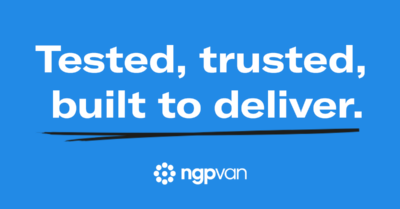Organizing Still Matters: What We Saw in Virginia in 2017
If there was ever any question, Tuesday’s stunning results in Virginia validated the important roles that both technology and grassroots organizing play in winning elections. Democrats routed their Republican opponents up and down the ballot, propelled by historic levels of voter engagement.
In 2017, we saw two main takeaways from these elections: down-ballot campaigns’ ability to harness grassroots energy, and an increase in new organizing techniques and tools. This cycle also saw a successful pilot test of our new Distributed Canvassing tool on MiniVAN, which is geared at making turf creation vastly more efficient for organizers and volunteers.
Grassroots Momentum and Volunteer Energy
Ever since the Women’s March in January 2017, the anti-Trump “Resistance” movement has been hyper-focused on winning in Virginia, and both the Democratic campaigns in Virginia and progressively-aligned organizations smartly channeled the energy and enthusiasm of grassroots activists.
Our clients like the Northam, Fairfax and Herring campaigns, the Virginia Democratic Party, and the incredible slate of Democrats running for House of Delegates were able to turn out thousands of volunteers to knock on doors and make phone calls for the campaigns. Additionally, groups like the AFL-CIO, Black PAC, CASA in Action, For Our Future, League of Conservation Voters, Let America Vote, New Virginia Majority, NextGen, Planned Parenthood, Progressive Turnout Project, and Working America worked all year to run large scale civic engagement campaigns that ultimately helped mobilize Virginians to vote on Election Day.
Door Knocking & Phone Banking
Since January 1st, 2017, tens of thousands of volunteers for the Democratic campaigns, state party, progressive organizations, and labor unions used VAN to knock on over 5.5 million doors in Virginia. The overall contact rate in Virginia was 22%, which tracks with the strong 26% rate we saw nationwide this year.
Notably, 2017 was the first year where we saw a majority of canvassers nationwide using MiniVAN to canvass instead of paper walk sheets — a 12% increase over 2016.

Additionally, volunteers both inside and outside the state used NGP VAN’s phone banking tools to make an impressive amount of phone calls to Virginia voters — over 5.1 million. Based on both conversations with others and public information, we can reasonably estimate that Republicans made around 2.5 million door knock attempts, or half of what progressives and Democrats achieved.
New Tools & Techniques
Since the beginning of the year, there’s been substantial energy and investment by us and many others in innovating, and in expanding the progressive technology ecosystem. That means many new apps and methods of voter contact and volunteer organizing, some backed by firms like Higher Ground Labs, used Virginia’s 2017 elections as a testing ground.
Distributed Canvassing
Our own product team saw Virginia as an opportunity to pilot a new ‘Distributed Canvassing’ tool on MiniVAN — and reached out to a group of field organizers working with the Virginia Coordinated campaign to partner on the pilot test.
Essentially, Distributed Canvassing with MiniVAN saves campaign organizers time by completely eliminating the need to “cut turf” in VAN. Users setting up a distributed canvass select a universe, a MiniVAN campaign, and assign a # of doors per canvasser. Then, canvassers simply type a list number into MiniVAN, and they are automatically assigned doors to knock based on geolocation. The MiniVAN app already saves time and resources by cutting out the need for all night printing and packet creation sessions, and this tool takes it a step further by cutting out the need to cut turf entirely. This tool actually came out of our annual hackathon, and the team called it #KillTurfCutter.
The feedback we received from this test was overwhelmingly positive — and the field organizers who utilized the tool were most excited about the time savings from no longer needing to cut turf. One organizer stated after the pilot that without the tool, they had spent an entire day cutting turf, and another day printing it into packets, and was excited that Distributed Canvassing will soon “make both processes obsolete.” This would result in saving many thousands of hours, especially during critical GOTV windows.
Connecting Third Party Apps via the Innovation Platform
One major goal of ours is to enable progressives to run sophisticated, multi-channel organizing campaigns. In Virginia, we served as an organizing hub and powered the movement of data between campaigns, organizations, and the different voter contact tools they use — facilitating millions more voter contacts beyond door knocking and phone banking. Since 2014, we’ve integrated with over 200 third party apps to better equip campaigns with an array of multi-channel organizing tools — and this cycle we rolled out integrations with dozens of powerful tools, including ones widely used like Hustle and Revolution Messaging.
This year, more campaigns than ever experimented with new peer to peer contact tools, text messaging apps, chatbots, and volunteer organizing tools to get out the vote like never before.

Implications for 2018 & Beyond
We’re confident that in terms of grassroots organizing, Virginia wasn’t an anomaly. In fact, from Washington state, to Georgia, to New Jersey, and all across the country, we saw campaigns and organizations harness more volunteer energy and run more sophisticated voter contact efforts than ever before. That bodes well for 2018.
We think next year, we’ll not only see a continuation of tried and true campaign tactics like door knocking and phone banking, but also an increase in down-ballot campaigns’ use of innovative tools like distributed canvassing on MiniVAN and peer-to-peer outreach apps to boost their candidates’ chances of success. We’re excited to continue working with progressive groups to build these tools, and we’re so proud to power the kind of progress we saw in Virginia on Tuesday night.



